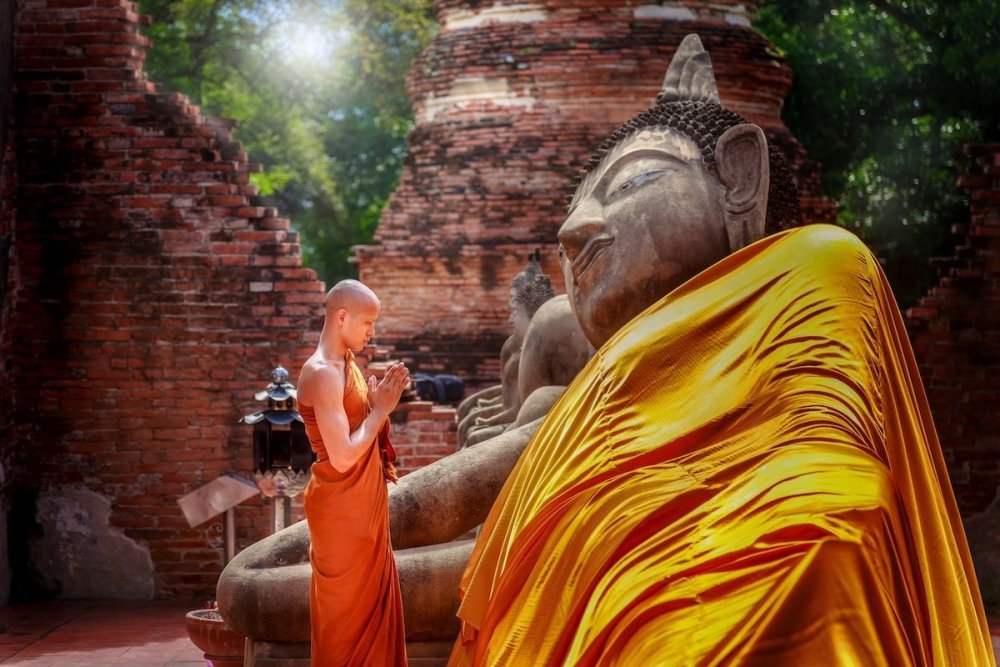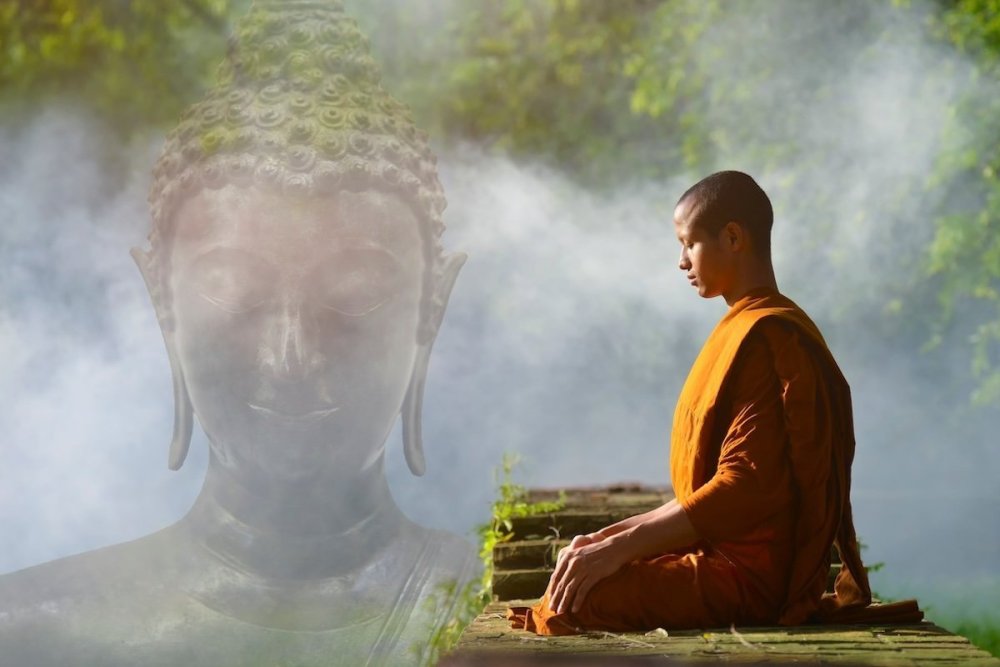If Buddhism is a religion, surely Buddhists believe in a God? In fact, technically Buddhists are atheists. Ann Vrlak explains why Buddha's beliefs encourages us to turn inwards instead.
Are Buddhists atheists? Nontheists? Or do Buddhists believe in God? These are all interesting questions, and ones that will help you understand how Buddhism is different from most Western religions.
In everyday language, atheist and nontheist have the same meaning – both refer to people who do not believe in God. In religious or spiritual terms, however, there is a subtle difference.
Atheism does mean a lack of belief in God, but atheists also believe there is no need for a “spiritual perspective” to understand life or to be a moral person. Nontheists also do not believe a God is necessary to guide human life, but they often do believe in the central role of spirituality.
In this sense, Buddhists are not atheist, but nontheistic. Buddhism does not have an omnipotent God who created the world, but it is a rich spiritual tradition.
Most Western religions are organized around a kind of God who is the ultimate authority. There are institutions with learned intermediaries, like priests, imams and rabbis who enable communication between practitioners and God.
Buddhism is different. It does not see belief in the existence of God as necessary to live a principled life. Instead, it is a comprehensive system of philosophy, ethics and practices that people can follow to awaken – meaning to have insight into the causes of human suffering and become free of it.
All religions acknowledge that life can be stressful and painful. However, instead of turning to a church or to God for answers, Buddhists believe every person has the ability to turn inward – to uncover their own insight through study, meditation and action.
“Buddhists are not atheist, but nontheistic. Buddhism does not have an omnipotent God who created the world, but it is a rich spiritual tradition.”
The Buddha explained it this way. There was a seed of knowledge inside of him that was undeveloped. Through his effort, this knowledge grew to its full form and freed him from the wheel of life and death. Most importantly, he told followers this seed, known as Buddha-nature, is something we all have. It can bloom through commitment to the teachings he left behind.
Isn’t Buddha a God?
You may think, “Of course, Buddhists believe in God, they worship the Buddha!” nIt is true the Buddha is the central, revered figure of Buddhism, with thousands of temples and statues built in his memory. But, he is not considered a God. Buddha is seen as a beloved teacher and friend.
RELATED:
The man who became the Buddha, Siddhartha Gautama, founded today’s worldwide religion around 500 BCE. Buddhists regard him as a person whose commitment to understanding and transformation was so profound that he transcended all suffering. In a time and place where poverty and rigid social structures shaped many people’s lives, this teaching was welcomed as an eminently hopeful and egalitarian one. We are all equal in our ability to awaken, regardless of our life circumstances. 
Big Seated Buddha Statue, Bangkok, Thailand
In fact, the Buddha actively discouraged metaphysical discussions. He believed in practical, individual change. Rather than divine power or a divine plan that is beyond our ability to influence, he taught the law of karma – or cause and effect. What we believe, what we practice, and what we do takes us into more suffering – or closer to freedom.
Why Don’t Buddhists Believe in God?
The Buddha taught that the desire for a God was not so much a religious desire, as a human one. He believed it came out of the need for an answer to the question of human suffering.
Buddha agreed there was no more important question. He encouraged everyone to examine the spiritual assumptions of the day, but through individual practice and investigation.
He challenged claims from religious institutions that truth could only come through God or their appointed teachers. Buddha’s teachings as a whole guide people to develop clear seeing, within and without. A core goal is to discover and begin to trust your own inner authority and knowledge.
“Instead of turning to a church or to God for answers, Buddhists believe every person has the ability to turn inward – to uncover their own insight through study, meditation and action.”
After all, the Buddha was a practical person. He saw that different religions had conflicting rules and beliefs. He questioned how people could decide which was “right,” without investigating through their own experience and insight. This is why he focussed on individual exploration and practice, rather than philosophical discussions that he believed would not yield wisdom or peace.
Given the range of religious beliefs today, and the tragic conflicts that sometimes happen, it seems the Buddha’s concern was well founded.
Are There Different Beliefs within Buddhism?
Like the other major religions, Buddhism has different types or branches that focus on certain beliefs and practices. You can read about this diversity in our article on the spread of buddhism.
Of the three main branches of Buddhism, Theravada, Mayayana and Vajrayana, two embrace a rich collection of deities. Mayayana and Vajrayana teachings include supernatural beings who help practitioners along the path.

Buddhists look to Buddha as a teacher and guide, not as a God
You may have heard the term Bodhisattvas. They are enlightened ones who, rather than transcending the human realm, remain behind to help others toward enlightenment out of compassion. These deities are not considered Gods, however. Instead, they are personifications of both positive and negative aspects of life. A person living with anxiety, for example, might call upon a deity of all-embracing love for comfort and strength.
Takeaway: do Buddhists believe in a God?
Buddhists’ belief in Buddha-nature cultivates a sense of unity with all beings. We all are subject to suffering, but we can also transcend it.
So, are Buddhists atheists? Technically, yes. But, they have a deep belief that Buddha-nature is a common calling we share. The Buddha’s teachings offer real-life ways to align our thinking, beliefs and actions with that calling to help it to grow. •
Images: shutterstock/Tanison Pachtanom, shutterstock/CowardLion, shutterstock/999 Studio
happiness.com | The fine art of being: learn, practise, share
Are you a happiness.com member? Sign up for free now to:
■ enjoy our happiness magazine with practical life tips
■ share and support others in our happiness forum
Altruism | Acceptance
Written by Ann Vrlak
 Ann Vrlak is Founder of OneSelf Meditation and a meditation practitioner for over 25 years. She’s a Certified Meditation Teacher for adults and for children (the best job ever!). She loves to share how the perspective and practice of meditation can support people with their everyday stresses and on their journey of self-discovery.
Ann Vrlak is Founder of OneSelf Meditation and a meditation practitioner for over 25 years. She’s a Certified Meditation Teacher for adults and for children (the best job ever!). She loves to share how the perspective and practice of meditation can support people with their everyday stresses and on their journey of self-discovery.


Join the conversation
You are posting as a guest. If you have an account, sign in now to post with your account.
There are no comments to display.